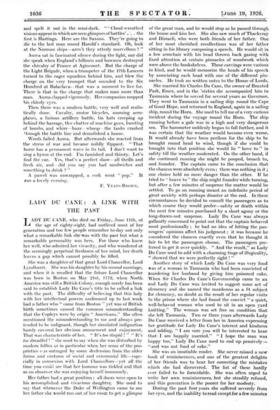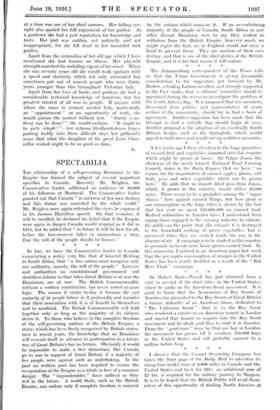LADY DU CANE : A LINK WITH THE PAST
LDYA DU CANE, who died on Friday, June 11th, at the age of eighty-eight, had outlived most of her generation and too few people remember to-day not only what a remarkable link shwas with the past but what a remarkable personality was hers. For those who knew her well, who admired -her vivacity, and who wondered at the seemingly perpetual freshness of her mind, her death leaves a gap which cannot possibly, be filled.
She was a daughter of that great Lord Chancellor, Lord Lyndhurst. She was his daughter by his second marriage, and when it is recalled that the future Lord Chancellor was born in Boston on May 21st, J 772, when North. America was still a British Colony, enough surely has been said to establish Lady Du Cane's title to be called a link with the past. The difficulty of believing that this lady with her intellectual powers undimmed up to last week had a father who " came from Boston " yet was of British birth sometimes caused the common misunderstanding that the Copleys were by origin " Americans." She often mentioned the misunderstanding to me and always pre- tended to be indignant, though her simulated indignation barely covered her obvious amusement and enjoyment. That was characteristic of her. " It's too stupid ! " " It's too dreadful ! " she used to say when she was disturbed by modern follies cr in particular when her sense of the pro- prieties v=as outraged by some declension from the older forms and customs of social and ceremonial life—espe- cially in connexion with Lord Chancellors—yet all the time you could see that her humour was tickled and that as an observer she was enjoying herself immensely.
Her father had a great position ; all doors-were open to his accomplished and vivacious daughter.. She -used to say that whenever the Duke of Wellington came to. see her father she would run out of her room to get a glimpse of the great man, and he would stop as he passed through the house and kiss her. She also saw much of Tliackerai and Disraeli, who were both friends of her father. One of her most cherished recollections was of her father sitting in his library composing a speech. He would sit in a low armchair with his head thrown back gazing with fixed attention at certain pinnacles of woodwork which were above the bookshelves. These carvings were various in kind, and he would• memorize the heads of his speech by associating each head with one of the different pin- nacles. He took no written notes to the House of Lords.
She married Sir Charles Du Cane, the owner of Braxted Park, Essex, and in the 'sixties she accompanied him to Tasmania where he served for several years as Governor. They went to Tasmania in a sailing ship round the Cape . of Good Hope, and returned to England, again in a sailing ship, round the Horn. She used to tell me of a very curious incident during the voyage round the Horn. The ship running before a gale was in a high and very dangerous sea. The barometer suddenly began to fall further, and it was certain that the weather would become even worse. It would already have been perilous for the ship to be brought round head to wind, though if she could be brought into that position she would lie " hove to " in safety till the weather moderated. On the other hand, if she continued running she might be pooped, broach to, and founder. The captain came to, the conclusion that the chances were absolutely even ; there was nothing in it ; one choice held no more danger than the other. If he tried to " heave to " the ship might founder while turning, but after a few minutes of suspense the matter would be settled. To go on running meant an indefinite period of great anxiety.with perhaps disaster at the end. In these circumstances he decided to consult the passengers as to which course they would prefer—safety or death within the next few minutes purchased by a short agony or the long-drawn-out suspense. Lady Du Cane was always gallantly concerned to point out that the captain behaved most professionally ; he had no idea of letting the pas- sengers' opinions affect his judgment ; it was because be considered the chances exactly even that he thought it fair to let the passengers choose. The passengers pre- ferred to get it over quickly. " And the result," as Lady Du. Cane used to add with a charming tinge of illogicality, " showed that we were perfectly right ! "
Another story of which Lady Du Cane was very fond was of a woman in Tasmania who had been convicted of murdering her husband by giving him poisoned cake.. iThen Sir Charles Du Cane's Governorship came to an end Lady Du .Cane was. invited to suggest some act of clemency and she named the murderess as a. fit subject for clemency, no doubt as the result of her regular visits to the prison where she had found the convict " a quiet, well-behaved woman who used to sit in an .open yard knitting." The woman was set free on condition that she left Tasmania. Two or three years afterwards Lady Du Cane received a letter from her in America expressing her gratitude for Lady Du Cane's interest and kindness and lidding, " I am sure you will be interested to hear that: I am happily married." " I hope the man was happy too," Lady Du Cane used to end up pensively- " and was not fond of cake."
She was an insatiable reader. She never missed a new book of reminiscences, and one of the greatest delights of her friends was to hear her correcting the mistakes which she had discovered. The list of these hardly ever failed to be formidable. She was often urged to write her own reminiscences, but- she steadily refused, and this generation is the poorer for her modesty.
During the past four years she suffered severely from her eyes, and the inability to read except for a few minutes . at a time was one of her chief sorrows. Her failing eye- sight also spoiled her full enjoyment of her garden. As a gardener she had a just reputation for knowledge and taste. Her 'end was sudden, not unkindly and not inappropriate, for she fell dead in her beautiful rock garden.
Apart from the infirmities of her old age which I har=e mentioned she had known no illness. Her physiCal strength matched the unfailing vigour of her mind. When she was seventy years old she would walk upstairs with a speed and elasticity which not only astounded but sometimes put out of conceit people who were thirty years_ younger than this triumphant Victorian lady.
Apart from her love of books and gardens she had a considerable technical knowledge of furniture, but her greatest interest of all was in people. If anyone with whom she came in contact needed help, particularly an -" appointment " or an opportunity of work, she would pursue the matter without rest. " Surely stme- thing can be clone ! " she would exclaim. " It ought to be qu'te simplo! "—her extreme kindheartedness tram- porting bodily into these difficult days her girlhood's sense that what the. daughter of the great. Lord Chan- cellor wished ought to be as good as done.
A.











































 Previous page
Previous page